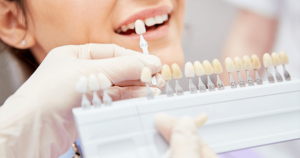Black Spots on Teeth: Causes, Types, Prevention, and Treatment

Having a healthy, radiant smile can significantly enhance one’s confidence. However, black spots on teeth can cause concern and self-consciousness.
This article will explore the causes, types, prevention, and treatment options for black spots on teeth.
Causes of black spots on teeth
Several factors can contribute to the development of black spots on teeth. Understanding these causes is crucial to address the issue effectively.
Poor oral hygiene
Neglecting proper oral hygiene practices, such as irregular brushing and flossing, can lead to black spots on teeth. Plaque buildup and bacterial growth can cause discoloration and decay.
Tooth decay
Tooth decay is a common cause of black spots on teeth. Bacteria breaking down the enamel can result in cavities and dark spots. Neglected cavities may progress, causing further damage to the tooth structure.
Smoking and tobacco use
Smoking and tobacco use can significantly impact dental health. The chemicals present in tobacco products can stain the teeth, leading to the formation of black spots.
Additionally, tobacco use increases the risk of gum disease, which can contribute to tooth discoloration.
Staining foods and drinks
Consuming certain foods and drinks with solid pigments can cause external stains on teeth. Examples include:
- Coffee
- Tea
- Red wine
- Berries
- Dark-colored sauces
Over time, these stains can become more pronounced and turn into black spots.
Types of black spots on teeth
Black spots on teeth can be categorized into two main types:
- External stains
- Internal stains
Understanding these distinctions can help determine appropriate treatment options.
External stains
External stains refer to discoloration on the tooth’s outer layer, the enamel. These stains are typically caused by external factors such as foods, drinks, and smoking. External stains are often easier to remove compared to internal stains.
Internal stains
Internal stains within the tooth structure can be more challenging to address. They are commonly caused by tooth decay, trauma, or certain medications. Internal stains may appear as dark spots or discoloration from within the tooth.
Prevention and home remedies
Maintaining good oral hygiene practices and making certain lifestyle adjustments can help prevent and reduce the occurrence of black spots on teeth.
Brushing and flossing
Regular brushing with fluoride toothpaste and flossing are essential for removing plaque and preventing tooth decay. Brushing at least twice daily and flossing once daily can significantly contribute to maintaining a healthy smile.
Regular dental checkups
Scheduling regular dental checkups and cleanings is crucial for the early detection and prevention of dental issues. Dentists can identify and treat black spots on teeth before they worsen and provide professional cleaning to remove stubborn stains.
Reducing staining foods and drinks
Limiting the consumption of foods and drinks known to stain teeth can help prevent black spots. It is advisable to rinse the mouth with water or brush the teeth after consuming staining substances to minimize their impact.
Natural teeth-whitening remedies
Various natural remedies can help whiten teeth and reduce the appearance of black spots. These include:
- Brushing with baking soda
- Oil pulling with coconut oil
- Using hydrogen peroxide as a mouthwash
However, consulting with a dentist before trying home remedies is advised.
Professional treatments
In cases where black spots on teeth persist or are more severe, professional dental treatments may be necessary to achieve the desired results.
Teeth whitening
Professional teeth-whitening procedures dentists perform can effectively remove stains and brighten the teeth. This treatment may involve in-office bleaching or custom-fit trays with a whitening gel for at-home use.
Dental bonding
Dental bonding is a procedure where a tooth-colored resin material is applied to the affected teeth to improve their appearance. It can help cover black spots and restore the natural look of the teeth.
Dental veneers
Veneers are thin, custom-made shells bonded to the teeth’s front surface. They can effectively cover black spots and provide a durable, stain-resistant solution for a brighter smile.
Dental crowns
In cases where black spots are severe or associated with tooth decay, dental crowns may be recommended. Crowns are tooth-shaped caps that cover the entire tooth, restoring its appearance and function.
FAQs
1. Can black spots on teeth be removed at home?
While some home remedies may help reduce the appearance of black spots, consulting with a dentist for proper evaluation and treatment is recommended. Dentists can provide professional solutions tailored to individual needs.
2. How long does it take to whiten teeth professionally?
The duration of professional teeth-whitening treatments can vary depending on the severity of the stains and the chosen method. In-office whitening procedures typically take one to two hours, while at-home treatments may take a few weeks to achieve the desired results.
3. Are there any side effects of teeth whitening?
Some individuals may experience temporary tooth sensitivity or gum irritation following teeth-whitening procedures. These side effects are usually mild and subside within a few days. Follow the dentist’s instructions and use whitening products as directed to minimize potential risks.
4. Can teeth whitening damage enamel?
When done correctly and under professional supervision, teeth whitening treatments are generally safe and do not damage enamel. However, overusing or misusing whitening products or undergoing unregulated treatments can harm the enamel. It is critical to consult with a dentist to ensure the safest and most effective whitening approach.
5. How can I prevent black spots on my teeth in the future?
To prevent black spots on teeth, it is crucial to maintain good oral hygiene practices, including regular brushing and flossing. Additionally, limiting the consumption of staining foods and drinks, quitting smoking or tobacco use, and scheduling routine dental checkups are effective preventive measures. Seeking prompt dental treatment for any signs of tooth decay or discoloration can also help prevent black spots from worsening.
Conclusion
Various factors, including poor oral hygiene, tooth decay, smoking, and staining foods, can cause black spots on teeth.
Understanding the causes and types of black spots is vital for implementing preventive measures.
Maintaining good oral hygiene, reducing consumption of staining substances, and seeking professional treatments when necessary can help achieve a healthy, bright smile.
Schedule a consultation today and embrace the journey to a healthier smile.
Or:
- Call us at: 586-788-0881
- Email us at: info@amberdentalsmiles.com
Amber Dental is located in Sterling Heights, MI, and we happily welcome folks from the neighboring areas.

